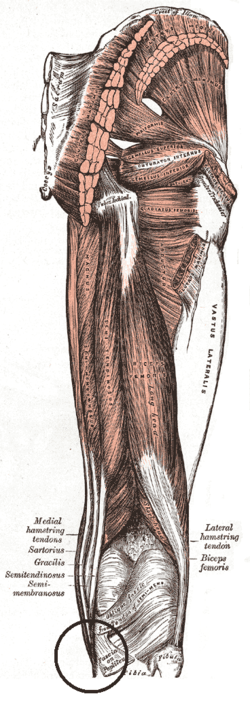Pes anserinus (leg)
| Pes anserinus | |
|---|---|
 Muscles of the gluteal and posterior femoral regions. Area of pes anserinus is encircled at bottom. sartorius, gracilis and semitendinosus are labeled at bottom left. | |
| Details | |
| Identifiers | |
| Latin | Pes anserinus |
| FMA | 311256 |
Pes anserinus ("goose foot") refers to the conjoined tendons of three muscles that insert onto the anteromedial (front and inside) surface of the proximal extremity of the tibia. The muscles are the sartorius, gracilis and semitendinosus sometimes referred to as the guy ropes. The name "goose foot" arises from the three-pronged manner in which the conjoined tendon inserts onto the tibia.[1]
Structure
The three tendons, from front to back, that conjoin to form the pes anserinus come from the sartorius, gracilis and semitendinosus muscles.
The pes anserinus lies superficial to the tibial insertion of the medial collateral ligament of the knee.
Clinical significance
It is a cause of chronic knee pain and weakness ("pes anserine bursitis").[2][3] Pes bursitis is a condition in which the medial portion of the knee is inflamed. If the bursa underlying the tendons of the sartorius, gracilis, and semitendinosus gets irritated from overuse or injury, a person can develop this ailment. This condition usually occurs in athletes from overuse. This pathology is characterized by pain, swelling, and tenderness.[2]
The semitendinosus tendon can be used in certain techniques for reconstruction of the anterior cruciate ligament.[4]
Additional Images
- Muscles of the posteromedial thigh, medial view.
References
- ↑ Mochizuki T, Akita K, Muneta T, Sato T (January 2004). "Pes anserinus: layered supportive structure on the medial side of the knee". Clin Anat. 17 (1): 50–4. doi:10.1002/ca.10142. PMID 14695588.
- 1 2 pmr/104 at eMedicine - "Pes anserinus bursitis"
- ↑ Alvarez-Nemegyei J (April 2007). "Risk factors for pes anserinus tendinitis/bursitis syndrome: a case control study". J Clin Rheumatol. 13 (2): 63–5. doi:10.1097/01.rhu.0000262082.84624.37. PMID 17414530.
- ↑ Zaffagnini S, Golanò P, Farinas O, et al. (January 2003). "Vascularity and neuroreceptors of the pes anserinus: anatomic study". Clin Anat. 16 (1): 19–24. doi:10.1002/ca.10073. PMID 12486734.
External links
- Pes_anserinus at the Duke University Health System's Orthopedics program